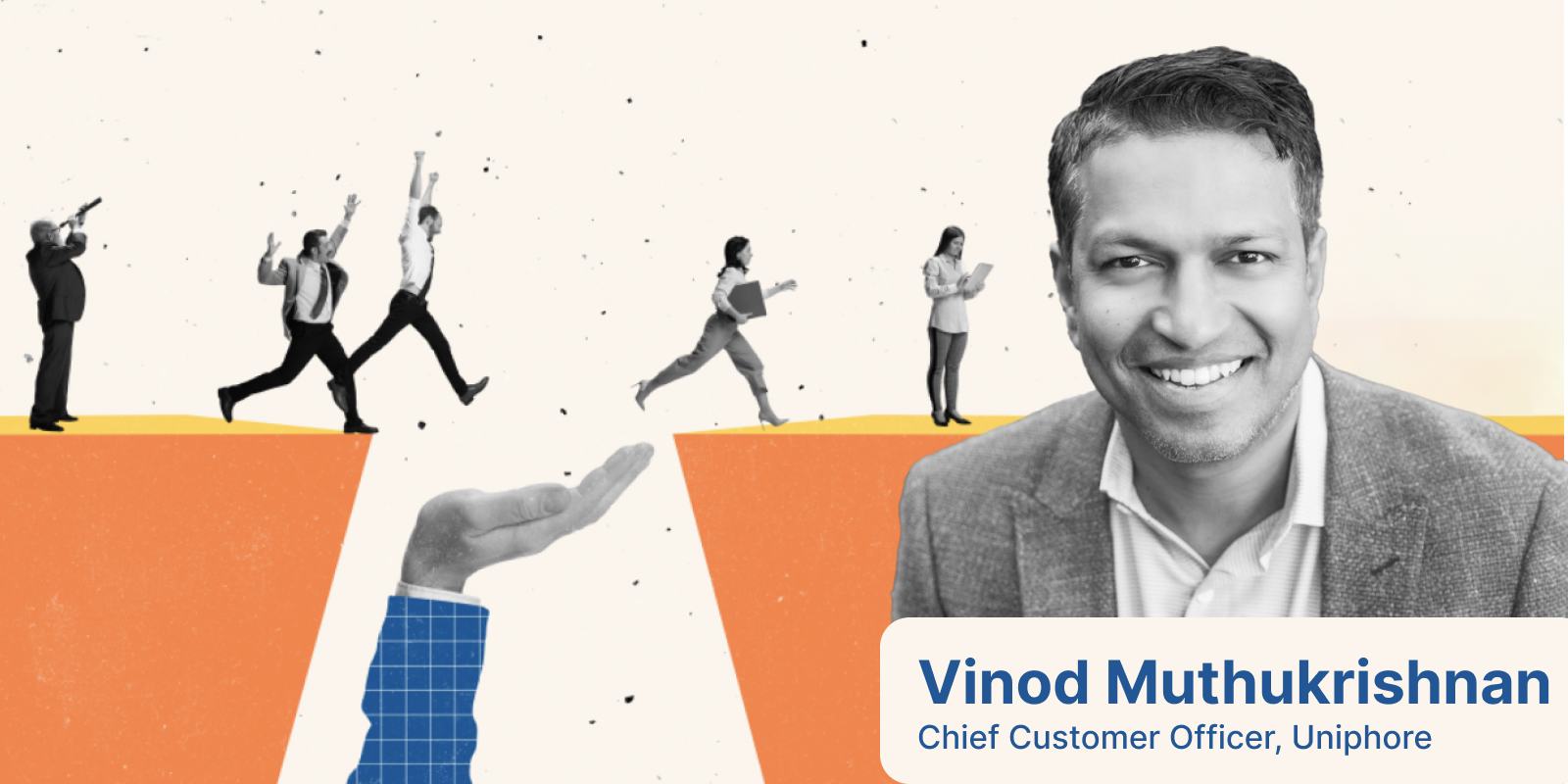Clear one obstacle for a founder, unlock millions in economic value: Vinod Muthukrishnan
Uniphore’s chief customer officer Vinod Muthukrishnan, who founded CloudCherry and sold it to CISCO, speaks on the importance of prioritising company culture and founder mental health.
Key Takeaways
● Community helps founders know they are not alone in struggling, says Uniphore’s Vinod Muthukrishnan.
● Nothing is more important in startups than culture, according to Muthukrishnan.
● Paying it forward is important. If the community can clear one obstacle for a founder, it can unlock millions in economic value.
● If you’re building for the US, start in the US, is Muthukrishnan’s advice to other founders.
● The founder’s life is not easy, so they need to prioritise mental health.
What does it take to build a successful customer support business out of India, move it to the US, and sell your company to CISCO?
It’s not years of business education, at least going by the experience of CloudCherry founder Vinod Muthukrishnan. Muthukrishnan does have BITS Pilani on his resume, but he studied nautical engineering there.
It doesn’t necessarily take a background in software. Muthukrishnan’s father was in the army and his own career started in the merchant navy, where for nine years he only got the internet twice a day “by connecting to a satellite”.
Learning by doing can help a lot, but it has its limits too. “After the merchant navy, I joined a friend’s fintech startup, and in my seven years there I learnt everything about sales, marketing, building a product and building a team,” Muthukrishnan recalls.
"So when I started up on my own, I thought I knew everything, but I knew nothing. Sales is one thing but conceptualising everything from company strategy to business strategy to product strategy to execution is a whole different thing.”
It was like the UB40 song, he says: The more I learn, the less I know about before.
Vinod Muthukrishnan started CloudCherry in 2014 and took an exit after CISCO acquired it in 2019. He is now the chief customer officer at conversational AI platform Uniphore. He is also on the governing council of SaaSBOOMi, a group where SaaS founders exchange insights, and advisor at venture firm March Capital.
So what did get him to the top? Everywhere he goes, you will find him talking about the two things he believes all founders—no matter what their individual journey looks like—need for success. Community and culture. That is what it takes.
Calling on the community
When he launched his own venture, Muthukrishnan says he learnt the hard way that being a founder was different from being second-in-command at his friend’s startup.
“I never had salary pressure before. But when you’re the CEO, you’re the CEO. There’s only one person running the company for a reason. Thankfully, I had the support of mentors and peers.”
The founder journey is lonely and demanding. That is why he is an advocate for finding community and paying it forward. “I was really clueless, but when I was connected to the SaaS community, I discovered I’m not alone in my struggle.” Most successful entrepreneurs were generous with sharing the tricks of the trade, Muthukrishnan realised, because they really believed India is going to be a product nation and wanted to play a bigger role. He found mentors in Freshwords founder Girish Mathrubootham, FusionCharts’ Pallav Nadhani, and Together Fund’s Manav Garg, among others.
“I’ve been such a beneficiary of the pay-it-forward philosophy, that I’d have to be a really poor human being if I didn’t pay it forward.” Because he had spent six months in the US alone while moving CloudCherry there, he had insights for anyone planning to move. “If you can clear one obstacle for a founder, you’re unlocking millions of dollars of economic value.”
Apart from mentors and peers, he also benefited from engaging with the wider ecosystem. His advice is to focus on business development from Day 1. “The founder has to network agenda-less and spread the gospel, sell the company to early investors, employees, partners, customers, what have you.”
It was through such “evangelising”, during a stint in the Microsoft Accelerator program, that CISCO discovered his company and decided to invest, before eventually buying out the business.
“Serendipity is proportional to density,” Muthukrishnan likes to say. “You need to create density in your actions and your network, then serendipity will happen. It won’t happen sitting at home.”
Putting culture on top of the list
Muthukrishnan delivers these pieces of advice with an authenticity that is infectious. He is equally frank, for instance, about the mistakes he made too. When he first got a call from CISCO, he asked them why they were interested in customer support software, not knowing they were a major customer experience provider.
He also says he could have done better in understanding company structure and captable. A lot of the latter was corrected after investors came on board and realised enough equity wasn’t with the ones building the company. “Girish (Mathrubootham) jokes that I’m the only founder whose equity went up with every round of funding.”
At one point in CloudCherry’s journey, before it was acquired, Muthukrishnan ran out of cash and couldn’t pay his employees in time. “I turned up at 11:30 in the morning with trepidation. I knew my team and what their financial obligations were, what bills they were paying—knowing that was great because we had created family culture, but it’s hard when you don’t pay salaries.” Contrary to expectations, the office was upbeat. “I show up and the kids are all high energy, then I said this crew is worth fighting for.”
Nothing is more important in startups than culture, according to Muthukrishnan. “The product changes, but culture is what ensures your team does what is right for the customer, for your partners. All the hard issues are easier when you are culturally bound.” That comes with spending time with the team, inviting them to talk, listening and learning.
That high-energy team stayed with him through the CISCO years and joined him at Uniphore. After he sold his company, Muthukrishnan never intended to work for anyone again. “But Umesh (Sachdev) is a compelling personality, he browbeat me into coming in.”
Helping founders go to market
Muthukrishnan lives and works from Pleasanton, Bay Area now. His leisure hours are spent on cricket and reading less voraciously than he would like to. And his doors stay open for any founder looking for direction in the US. He shares some of the things he tells them.
“If you’re building for the US, start in the US,” he says. “Don’t do $1 million ARR in India and then go to the US, because now you’ve built teams, structures, delivery, culture for India. If you have to build for the US, build from day zero.”
That is especially true for SaaS companies building for enterprises, in Muthukrisnan’s view. “Nobody wants their data outside, so enterprise businesses need you to be in the market you are selling in. For SMBs, you can (build remotely) in India.”
Despite the overwhelming success that is possible, the founder’s life is not easy. “If you sign up for it, you’re going to have real bad days, with a few good days.”
Muthukrishnan’s candid talks with newbie founders have come to be called ‘beer, biryani and brainstorm’. “There is veg biryani and Rooh Afza too, so we don’t discriminate,” he says, with a laugh. “It is a safe space—if a founder walks away with clarity on one tactical issue, I find joy in that.”












